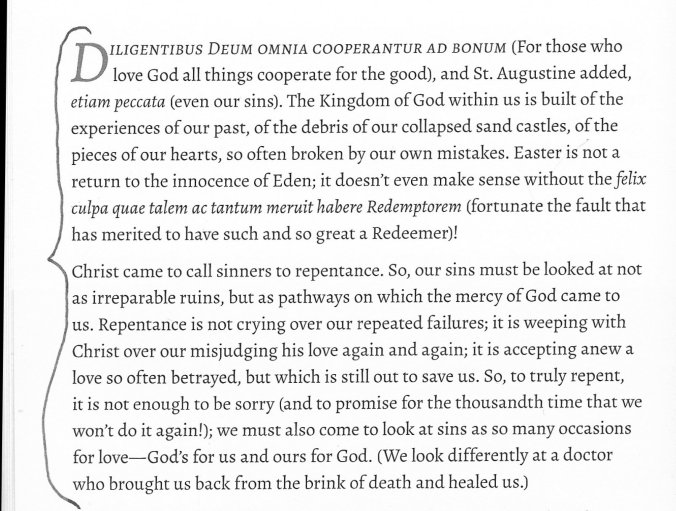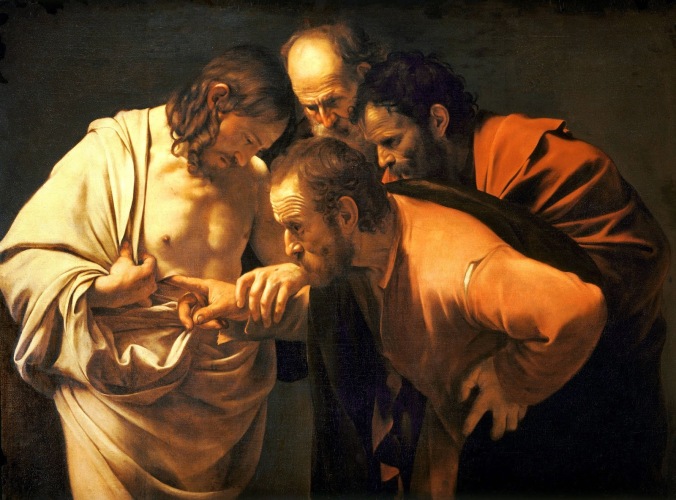Meetings and conversations can be important, insofar as they provide opportunities for us to share our faith with others. In this morning’s reading from the Acts of the Apostles we see a chance encounter which leads to faith, and new life in Christ. When the Apostle Philip, a Greek-speaking deacon, meets an Ethiopian court official on the road from Jerusalem to Gaza, he comes across a man reading the prophecy of Isaiah: who is a financial expert, highly trusted, and well-educated, he is a man of power and influence. He’s clearly looking for something, he’s been worshipping God in Jerusalem. Philip asks him if he can understand what he is reading. The Ethiopian replies that he cannot, unless someone shows him the way. ‘Then Philip opened his mouth, and beginning with this Scripture he told him the good news about Jesus.’ (Acts 8:35 ESV)
The scroll of the prophet Isaiah was open at the fifty-third chapter, a reading which we read on Good Friday, which talks of suffering and death. The Ethiopian was reading ‘Like a sheep he was led to the slaughter and like a lamb before its shearer is silent, so he opens not his mouth. In his humiliation justice was denied him. Who can describe his generation? For his life is taken away from the earth.’(Acts 8:32-33) and asks whether this is about Isaiah or someone else. Philip’s reply is that Isaiah’s prophecy is fulfilled in Jesus and this is the proclamation of the Church: we proclaim Jesus Christ and him crucified, who suffered and died for love of us.
We read scripture so that we can understand it, and see in its words how it discloses the truth of the Word made flesh, who suffered and died for our sake. Isaiah prophesies Our Lord’s Passion and Death, and thus it makes sense, it can be understood, and the more we come to understand, the more we come to know just how much God loves us. The Scriptures, the entire of the Law and the Prophets point to Jesus Christ, they find their meaning and fulfilment in Him, who is the Word of God made flesh. Just like the story of the sacrifice of Isaac by Abraham points to the sacrifice of Christ on the Cross, where God gives his only Son for love of us, it is prefigured by the ram in the thicket, which points to that moment where John the Baptist can cry out ‘Behold the lamb of God who takes away the sins of the world!’ (Jn 1:29)
How can I understand it unless someone guides me? It is a good question, a difficult question, and a controversial one. How we interpret the Bible matters, and who can or cannot, is a vexed question. There are those who consider it a private matter, that everyone can make their own mind up, but that will only lead to chaos and confusion. In the Church, for two thousand years we have interpreted the words of the Bible in a way which is consonant with Tradition, handed down through the Church Fathers. The Church has always understood the entirety of the Old Testament, the Hebrew Scriptures in a Christological way — they point to Christ and they find their fullest meaning in Him: the Word of God discloses the Word made flesh. Such things matter, we don’t just make things up as we go along, or according to our feelings. I don’t preach to you in that way, but rather I try to explain how the Bible talks about Jesus, and how that affects our lives as Christians.
Having been nourished by the Word of God, our unnamed Ethiopian desires baptism: he points out a water source, a rarity in this desert landscape, and asks what is preventing him from being baptised. Nothing, Philip replies, if you believe in Him. The Ethiopian states his belief that Jesus Christ is the Son of God, and is saved, and reborn in the waters of baptism, something we focus upon in this Easter season.
He desires baptism so that he may be ‘in Christ’ rooted and grafted, close to him, filled with His Spirit, so that he may bear much fruit. It is believed that this man went home, and began the Church in Ethiopia. Something which has continued for two thousand started with one man, and a conversation.
When we were baptised we were clothed with Christ, we were grafted into the vine, which is Christ, and we abide in Him. It is Christ’s will that we, as Christians bear much fruit, which means that we live out our faith in our lives, so that it affects who and what we are and say and do. We do this because it is what Christ expects of us, but also because, as we heard in the First Letter of John, ‘the love of God was made manifest among us, that God sent his only Son into the world, so that we might live through him’ (1Jn 4:9 ESV).
![]()
When I was a teenager I went on holiday to Greece with my parents, and while we were there they bought an icon for our home, it depicts Christ and the Disciples as a vine. It is a powerful vision of what the Church is, people who are grafted into Christ, connected to Him, in a relationship with Him. We entered into that relationship in our baptism, and it is a relationship which will continue through and after our life on earth.
Because we are grafted into Christ we are in communion with Him. He gives Himself to us in the Eucharist, His Body and Blood, so that we can have life in Him. He gives Himself to us out of love, so that we might have life in Him, and have it forever. It is a pledge of eternal life with Him, united in this world and the next, given to us to strengthen us on the journey of faith. It is given to help us live out our faith in our lives – fed by Him, fed with Him, to live in Him and for Him.
When we are close to Christ, washed clean by our baptism, nourished by Word and Sacrament, we can truly be Christ’s disciples, living in Him, living for Him, proclaiming Him, and bearing much fruit, so that the world may believe and give glory to God the Father, God the Son and God the Holy Spirit, to whom be ascribed as is most right and just, all might, majesty, glory, dominion, and power, now and forever.

